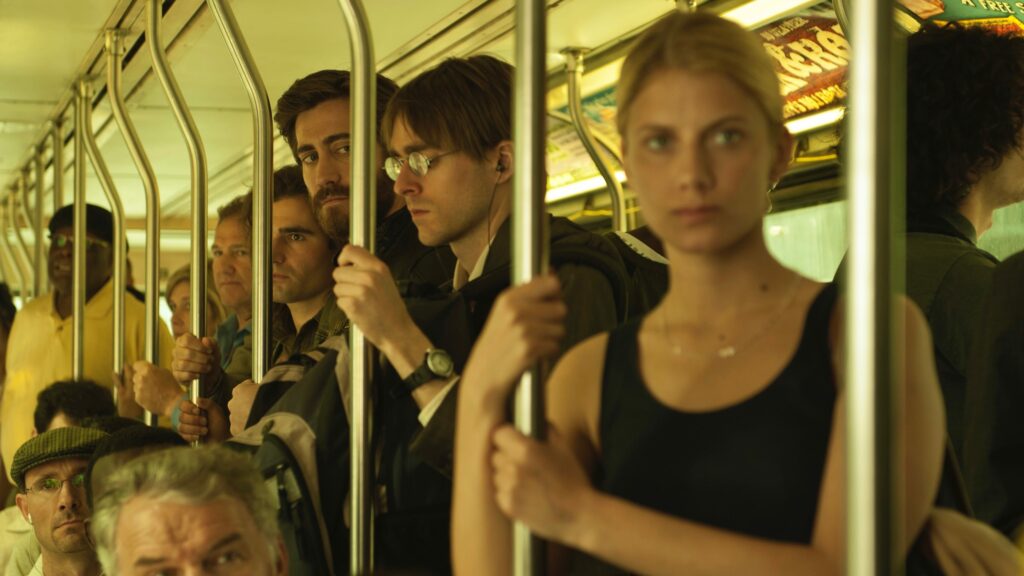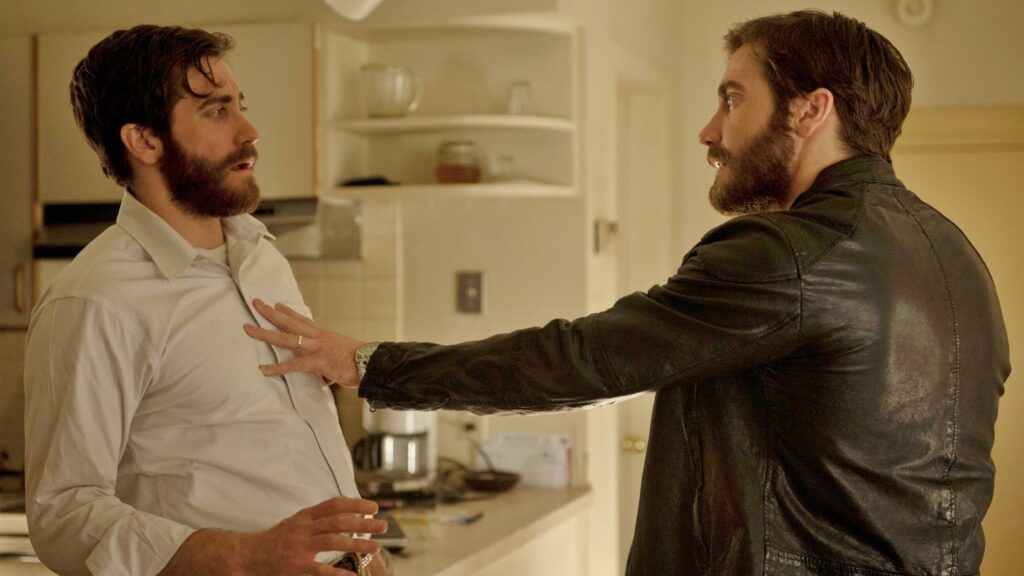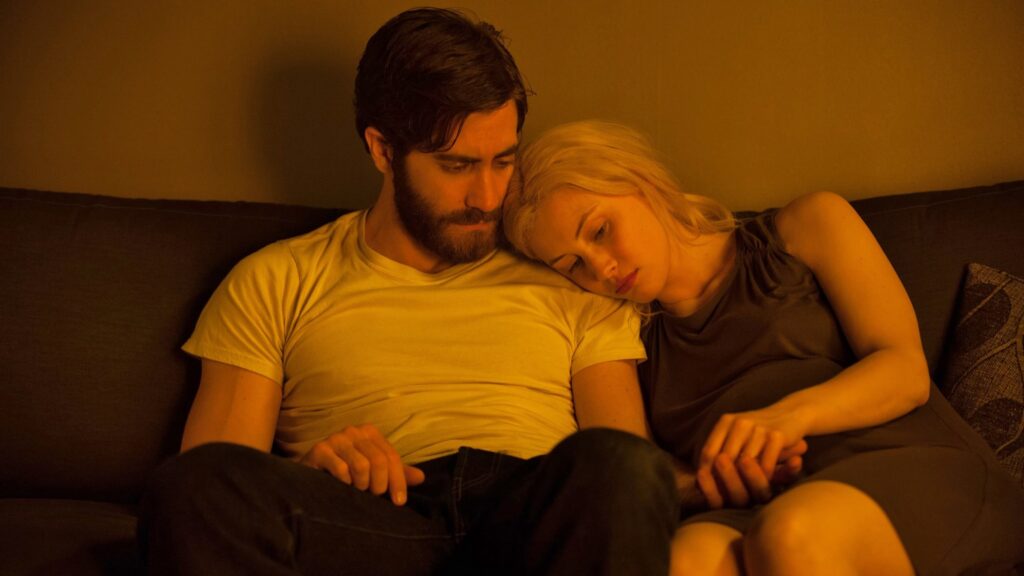Oh, I can't believe it. I got an enemy. Me! The most beloved man in Springfield.
I really wish that I loved Enemy more than I did. I mean, I guess that’s true of any movie I have a negative response to. But Enemy in particular is the kind of movie that I deeply love in theory: A quieter, smaller film that takes some ambitious writing swings and gets slightly lost in the narrative of a director rising to new artistic heights. I’m a firm believer that prolific filmographies are underrated, especially if it results in more movies that are content to be weird little larks rather than canonical statement films. Enemy is Denis Villeneuve’s shortest, lowest-budget, least-seen English language feature; and, though I have not yet seen any of the five released after this as of this writing, I would wager money it is his strangest.
I even like the idea of Enemy’s story: Adam Bell (Jake Gyllenhaal), a discontented and aloof college professor, discovers a person who is an exact mirror image of himself, right down to the same scar. This doppelganger, Anthony Claire (also Gyllenhaal) is an assertive and bossy failed actor, the inverse personality of the timid Bell. As Bell investigates Claire, the movie that starts as a thriller gradually drifts deeper into a dream logic and elliptical reality. All of that sounds like a pretty damn great hook to me!

So where does it go wrong? If I may be reductive, I’ll say that this a movie that wants to be a Lynchian odyssey and exploration of identity (like Mulholland Drive) but Villeneuve is not Lynch. Everything I love about surreality in filmmaking is missing from this film. As a piece of visual storytelling, it’s a bore: a piss-yellow monochrome bore staged in dull interiors, stagey and inert rather than sucking us in and daring us to enter Bell’s psyche. As a fable, Enemy it’s woefully on-the-nose, practically requiring you to read it symbolically rather than letting its messiness stand on its own. Great pieces of surreal filmmaking hold up whether you take them at absurdist face value or try to piece ithem together into something more. Face value is not an option here: Enemy tasks you with designing a crib sheet of themes — spiders mean THIS and sex clubs mean THAT.
I found the film’s ending to be especially frustrating. Parts of the final stretch are deeply intriguing and suggestive and ways I appreciated — two realities converging as the scenarios of Gyllenhaal’s two characters crash together more and more. And then, BAM. The movie throws a pie in your face with a jump scare dingbat final shot that amounts to Villeneuve doing jazz hands as he says “really makes ya think!” It practically railroads you into a specific reading about the nature of Bell and Claire, which I will elucidate in a spoiler box below (see the asterisk). Can I entirely reconcile my annoyance towards this ending with my total adoration of the twisted final act of Mulholland Drive or the film-reframing twist of The Usual Suspects? Maybe not entirely, and if I had seen Enemy at age 19 the way I did The Usual Suspects, I imagine I’d like it more. But Enemy is lazier than most movies that aim for a mind-bending mic drops. It sucks the air out of the scenario rather than exploding it into a million questions and possibilities.

The problem isn’t the performance at the heart of the film: Gyllenhaal does some terrific work playing two very distinct individuals that still have the right amount of blurry, overlapping edges. He also pulls that double-role-switch trick of playing characters pretending to be other characters, and making it obvious but not too obvious. He’s backed up by Melanie Laurent and Sarah Gadon as the various women in his life, who are both good; Gadon in particular is a bit of a revelation, vulnerable and terrifically expressive.
What is a problem, though, is the film’s look. As mentioned, this is a major disappointment in the cinematography front, flat with dull coloring, though one Villeneuve would bounce back from quite well. The next two films he made — Prisoners (shot later, released earlier) and Sicario — had Roger freaking Deakins executing some world-class lighting and visual composition on their behalf. The cinematographer of Enemy, Nicolas Bolduc, comes from a similar French Canadian background as Villeneuve — perhaps they networked as Villeneuve moved to Hollywood — but is not up to turning the film into anything memorable or pleasing visually.
But even more than the visual profile, it’s the writing and the sloppy characterization. While this world is certainly operating with a dreamy grasp of reality, the central mystery is not heightened by the characters’ inhuman behavior so much as it is crumpled into a heap. Why does anyone care that two people look sort of alike? Why aren’t we asking obvious questions about whether there was a hiccup at a sperm bank or perhaps two people go to the same barber and are both tall, generically handsome white guys? Why are we jumping straight to existential horror? The hooks to the story aren’t incisive enough to draw me in; I was stuck in an uncanny valley of watching people we assume to be human but don’t really act so.

And in spite of all my complaints, I still almost recommend Enemy. It’s a really interesting premise, poorly-staged but well-acted, and still provocative in its failures, likely to inspire a strong reaction, positive or negative. It makes for good post-movie discussion fodder. I would much more happily debate why this doesn’t work than I would defend why most movies I like do work. Hell, I’d even watch Enemy again with more excitement than plenty of movies I liked more. (That 93 minute runtime helps.)
But it’s still only an almost-recommendation. It doesn’t clear the bar. It’s just too much of narrative and visual misfire, with a patently ridiculous final payoff for a movie so built on intrigue that a dumb ending torpedoes the film.
The further the movie runs, the more Denis Villeneuve leans into the idea that Bell and Claire are in fact the same person in some sort of split psyche format: One (Bell) who is gentle and needy and committed, and one (Claire) who is afraid of commitment and impulsive and thrill-seeking. There seems to be something cyclic in the nature of his split persona — one gradually takes over the other part of his life, and then back again.
It also seems that Bell’s girlfriend, Mary (Laurent), is some sort of affair or fling that he drags along, while Claire’s wife Helen (Gadon) is aware of this relationship but thinks it’s in the past.
The spider, meanwhile — web-maker and predator — is a symbol of a frightening, entrapping commitment to settling down and Claire/Bell’s fear of domestic life. Only after Bell rediscovers the key to the sex club — his chance at escape from being tied down to his pregnant wife — does he see Helen as that sort of “spider,” and starts to become Claire again.
Mary and Claire’s deaths, meanwhile, read as more metaphorical, Bell’s commitment to home life and ending the affair becoming the dominant personality force. But just a scene later, that starts to shift again in that bizarre finale. These big twists are rushed in just two scenes, undercutting and obfuscating their impact.
There may very well be more to the film than that, but, as mentioned, I’m not sure this movie is deep or compelling enough to benefit from any more of a complex symbology or deconstruction.
- Review Series: Denis Villeneuve
Is It Good?
Nearly Good (4/8)
Awards, Honors, & Rankings
Dan is the founder and head critic of The Goods. Follow Dan on Letterboxd. Join the Discord for updates and discussion.


2 replies on “Enemy (2013)”
Not sure if I’ve mentioned this one before or not, but if you want a far richer and more interesting movie based around a similar idea, check out ‘The Double Life of Veronique.’ Kieslowski was brilliant.
‘The Double Life of Veronique’ is sooooo good, holy shit.